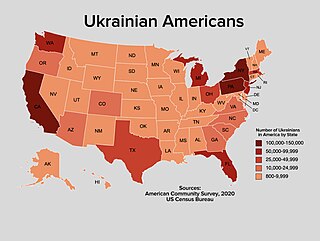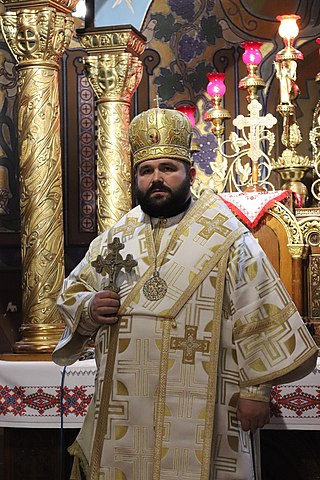
Lesya Ukrainka was one of Ukrainian literature's foremost writers, best known for her poems and plays. She was also an active political, civil, and feminist activist.

The Ivan Franko National University of Lviv is a public university in Lviv, Ukraine.

Ukrainian Americans are Americans who are of Ukrainian ancestry. According to U.S. census estimates, in 2021 there were 1,017,586 Americans of Ukrainian descent representing 0.3% of the American population. The Ukrainian population of the United States is thus the second largest outside the former Eastern Bloc; only Canada has a larger Ukrainian community under this definition. According to the 2000 U.S. census, the metropolitan areas with the largest numbers of Ukrainian Americans are: New York City with 160,000; Philadelphia with 60,000; Chicago with 46,000; Detroit with 45,000; Los Angeles with 36,000; Cleveland with 26,000; Sacramento with 20,000; and Indianapolis with 19,000. In 2018, the number of Ukrainian Americans surpassed 1 million.
Roma Pryma-Bohachevsky was a dancer and choreographer, who instructed thousands of students in the art of ballet and Ukrainian dance.

Olha Mykhailivna Basarab was a Ukrainian political activist and member of the Ukrainian Military Organization who conducted both charitable and humanitarian work that was recognized by the International Red Cross, as well as military or intelligence work on behalf of the Ukrainian underground. She was an executive of the Ukrainian Women's Union branch in Lviv. She was arrested by the Polish police after being accused of working with the Ukrainian Military Organization and of spying for Germany. Materials indicating cooperation with Germany's intelligence were found at her home. Different accounts of her death in prison exist ranging from suicide to murder. Afterwards she was seen as a martyr and source of inspiration within the Ukrainian community.
Constantine Bohachevsky, born in Manaiv, Ukraine, was an archbishop of the Ukrainian Catholic Church. He was the first Ukrainian Catholic metropolitan in the United States. Among his friends was the Ukrainian Catholic nun Emellia Prokopik, who took her first vows before him, and with her congregation in Pennsylvania, he said he felt most at home.

John-Paul Himka is an American-Canadian historian and retired professor of history of the University of Alberta in Edmonton. Himka received his BA in Byzantine-Slavonic Studies and Ph.D. in History from the University of Michigan in 1971 and 1977 respectively. The title of his Ph.D. dissertation was Polish and Ukrainian Socialism: Austria, 1867–1890. As a historian Himka was a Marxist in the 1970s–80s, but became influenced by postmodernism in the 1990s. In 2012 he defined his methodology in history as "eclectic".

Nataliya Kobrynska was a Ukrainian writer, socialist feminist, and activist from Austria-Hungary.

Khrystyna Danylivna Alchevska (1841–1920) was a Ukrainian teacher and a prominent activist for national education in Imperial Russia. She created a methodical training system which was implemented in many schools of Russian Empire. In 1862, she organized the first free girls' school in Ukraine. In 1889, she was elected vice-president of the International League of Education in Paris.

Bishop Mykhaylo Koltun, C.Ss.R. is a Ukrainian Greek Catholic hierarch as an Eparchial Bishop of Sokal–Zhovkva since 21 July 2000. Previously he served as an Eparchial Bishop of Zboriv from 20 April 1993 until 13 November 1996 and the second time from 7 November 1997 until 21 July 2000; and as Titular Bishop of Casae in Pamphylia and Archepiscopal Exarch of Kyiv-Vyshhorod from 13 November 1996 until 7 November 1997.

Milena Ivanivna Rudnytska was a Ukrainian educator, women's activist, politician and writer. One of the most influential voices in the interwar period of the Galician women's movement leadership, she published articles in various periodicals. As a member of the Polish Sejm between 1928 and 1935, she brought issues of suppression by government authorities to the world stage, including the Polish regime's efforts to repress the culture of minority Ukrainians and the Soviet regime's denial of starvation in Ukraine during the Holodomor. With the Soviet and Nazi occupations of Ukraine, Rudnytska fled the country and remained an exile for the remainder of her days, publishing books and articles as she moved throughout Europe and the United States.

The Ukrainian Women's Union (1920–1938) was the most influential women's organization operating among Ukrainian women outside of Soviet Ukraine. Because they represented Ukrainian nationals living in other sovereign states, the organization solidified their struggle for gender recognition with one for nationalist aims. Formed in Lviv in 1920, the organization did not focus on traditional feminist issues of equality and political agency until after they had built up a base membership and helped improve the social and economic lives of the peasantry which made up the majority of their membership.

Bishop Petro Loza is a Ukrainian Greek Catholic hierarch as the Titular Bishop of Panium and Auxiliary bishop of Sokal–Zhovkva since 12 April 2018.

Yaroslav Dashkevych (1926-2010) was Ukrainian historian, archaeographer, armenologist. He wrote over 1700 scientific and publicist works. Dashkevych was a representative of Hrushevsky school of history and a victim of Stalinist terror. He was a Doctor of Historical Sciences.

Uliana Kravchenko is the pen name of Julia Maria Schneider-Niementowska, was a Ukrainian educator, writer and the first Western Ukrainian woman to publish a book of poetry.
Stefan Vasylovych Turchak was an outstanding Ukrainian conductor, People's Artist of the USSR (1977) and a Laureate of the Shevchenko National Prize.

Klymentyna Karlivna Popovych-Boiarska was a Ukrainian writer, poet, and elementary school teacher born in Galicia. She was active in the Ukrainian women's movement, and wrote alongside Ivan Franko and Nataliya Kobrynska.
Mariia Biletska, sometimes Maria Biletska was a Ukrainian teacher. She ran a house in Lviv, where students could stay. She was a leader of the women's movement.

Emellia Prokopik was a nun of the Catholic Church in Ukraine. She served for 12 years as Superior General of the sisters of the Order of Saint Basil the Great of the Province of Jesus, Lover of Humanity in Pennsylvania, what the first Ukrainian bishop in the US called "cradle of the Ukrainian Catholic Church in the United States."

Ludmila Orestovna Gabel was a librarian, public figure and lawyer. She was born into a family of Narodnik revolutionaries, Orest and Augustina Gabel. She was a member of the Committee of Rural Libraries and the Book Commission of the Kharkiv Literacy Society. In 1887, after her father's exile ended, the family relocated to Kharkiv, where Ludmila pursued her education. She graduated from the second women's gymnasium in Kharkiv, earning the title of home tutor.















